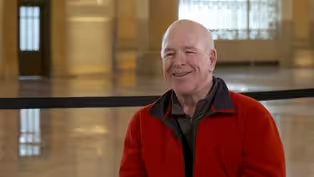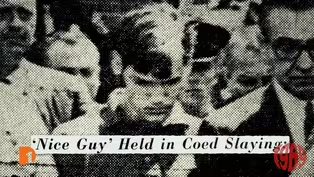
September is Black Reading Month encourages people to turn off the TV, read Black authors
Clip: Season 10 Episode 11 | 7m 53sVideo has Closed Captions
September is Black Reading Month encourages people to read books by Black authors.
The annual September is Black Reading Month observance encourages readers to explore literary works by Black authors. Contributor Stephen Henderson, host of “American Black Journal,” talks with September is Black Reading Month Co-Founder Malik Yakini about the creation of the observance and literary issues in America.
Problems playing video? | Closed Captioning Feedback
Problems playing video? | Closed Captioning Feedback
One Detroit is a local public television program presented by Detroit PBS

September is Black Reading Month encourages people to turn off the TV, read Black authors
Clip: Season 10 Episode 11 | 7m 53sVideo has Closed Captions
The annual September is Black Reading Month observance encourages readers to explore literary works by Black authors. Contributor Stephen Henderson, host of “American Black Journal,” talks with September is Black Reading Month Co-Founder Malik Yakini about the creation of the observance and literary issues in America.
Problems playing video? | Closed Captioning Feedback
How to Watch One Detroit
One Detroit is available to stream on pbs.org and the free PBS App, available on iPhone, Apple TV, Android TV, Android smartphones, Amazon Fire TV, Amazon Fire Tablet, Roku, Samsung Smart TV, and Vizio.
Providing Support for PBS.org
Learn Moreabout PBS online sponsorship(upbeat electronic music) - Black Reading Month, something you co-founded, let's start with the... Just the origin of that, how did you come up with this idea?
- Well, in 1978, '79, myself and my wife at the time... (indistinct) Yakini, and Dr. Keith Dye, had created a company called New Directions Information Institute, and we were distributing black magazines and books trying to get them in kinda mainstream stores throughout the city, so we noticed that grocery stores, for example, at the checkout counter, there were various magazines, but none of the magazines dealt with the black experience, or those who dealt with the black experience dealt with entertainment and issues like that, there were no real serious black publications in the places where people went every day to shop, so our attempt was to get those magazines and books in those kinds of stores, and so, for about two years, we were distributing, going every month, dropping off magazines like Black Enterprise and Africa Magazine, and others that dealt with serious issues of the day, but when we came back at the end of the month, we'd notice only one or two had sold, so we realized that it was more than just getting the publications.. Getting access to the publications, we needed a public campaign in order to promote the importance of reading black books and magazines, and so, we met with a number of other black book distributors and black book sellers in Chicago with Third World Press in the summer of 1980, and out of that, we decided to come back to Detroit and do something concrete, there had been a lot of discussion on the national level about some kinda promotional campaign, we decided to come back to Detroit and create Black Reading Month... September is Black Reading Month, we set it for September because that's the time when students are... At least at that time period, that's when students were going back to school, I understand students are going back to school earlier now, and also, it was the peak book-buying month in the book industry, so we wanted to not only promote literacy in general, we think it's important that people be literate and well-informed about what's going on both in their communities and in the world, but specifically, we wanted to promote the familiarity with the black literary tradition so that we can, as the people, ground ourself in our own experience and have a window to look at the world which is informed by that legacy.
- Yeah, yeah, and this is something that's celebrated in many different places now, I mean, it's kind of an international phenomenon.
- Yeah, well, you know, with the...
Especially with the advent of the information superhighway, as they used to call it, you know, people all around the country and around the world have become familiar with Black Reading Month and are celebrating it or observing it in various ways, the most fundamental way that we ask people to celebrate or observe Black Reading month is to read at least one book by a black author during the month of September, that's kinda the low bar, but at least one, you know, and that might sound like it's not a big accomplishment, but the reality is in American society, the average adult has not read a book in the last five years, and so, we have a tremendous problem with literacy in general, but again, with black people in this country, people of African descent, we have the problem of living in a society which has intentionally kind of covered up our history, our culture, and part of that is the tremendous contributions that we've made to literature.
- Yeah, yeah, you know, I think we'd be remiss to talk about reading and African-Americans without talking about the linkage between literacy and the word, and freedom and the idea of liberation, that both in terms of resistance to slavery and to things like Jim Crow that came after it, but also, in terms of just the idea of self-determination, that bedrock is very rich with the ability to read and the proclivity to read, to understand, to know more, to know ourselves and to know the world around us.
- Yeah, I don't think I could have said it better, Stephen, in fact, maybe we'll hire you as a spokesperson for Black Reading Month... (Stephen laughing) But our tagline has always been, "Black reading is crucial for black survival," and it really speaks to what you're saying, both in the times that we were in chattel slavery, having access to the printed word and having access to the world of information that that opens up was certainly a liberating experience and certainly something that our ancestors struggled for.
In the current time period, being well-informed is extremely important, and especially in this age of misinformation and intentional disinformation, it's important that we're reading from multiple sources, and that we're comparing that information, and that we're thinking critically, and that we're arriving at decisions which help to benefit ourselves as individuals, our families and our community.
We want people to do a couple things, one, as I said, to read at least one book during the month of September by a black author, and then, two, for those who are up to it, we ask them to participate in the turn-off-the-TV challenge, that is to turn off the television for the entire month except for shows like "American Black Journal."
- Except for "American Black Journal."
- Yeah, no, seriously, and which speak to our experience and help to uplift us, but we're trying to break people from the habit of kind of mindless television watching, and so, the turn-off-the-TV challenge during the month of September is really a fast of sorts, it's a fast to break our addiction to television, it's a fast that enables us to take the time that perhaps we were using watching television in the past and use that to read, and also, it's an exercise in self-discipline, fasting of any sort also always strengthens us and allows us to have the kind of fortitude to move through the challenges that we're facing in life.
- Yeah, yeah, so before we go, give me a suggestion for listeners, the one book if they might choose to read a book by an African-American author this month.
- Well, there's so many books, I can't narrow it down to one, but what I'll say is I've been doing lots of family research over the last several months and finding out incredible things about my family right here in Detroit, there's so much history that is still to be uncovered, much of it is out there, but it's in archives, and newspapers, and books, and so, we have to dig to find it, but one of the books I'm rereading is "Black Detroit" by Herb Boyd, I would strongly suggest that if people want to have an overview of the history of people of African descent in the city of Detroit, that that would be an excellent book to start with, "Black Detroit" by Herb Boyd, - Yeah, no, that's an excellent book, and of course, Herb's a great author and thinker.
I'm gonna suggest a book too, it's a book that I just bought last week, it's by a woman named Alice Randal and it is about the history and linkage of country music to the African-American tradition, the way in which country is ours like all American music is ours.
Bill Goodwin shares how his parents came to Detroit to find work in the automotive industry
Video has Closed Captions
Clip: S10 Ep11 | 1m 47s | Bill Goodwin of Shelby Township participates in One Detroit’s “Destination Detroit” series. (1m 47s)
Royal Starr Film Festival highlights Michigan films, including “1969: Killers, Freaks and Radicals”
Video has Closed Captions
Clip: S10 Ep11 | 8m 34s | The Royal Starr Film Festival showcases films from Michigan and around the world. (8m 34s)
Spanglish Fly brings Latin boogaloo to this year’s Concert of Colors
Video has Closed Captions
Clip: S10 Ep11 | 4m 20s | Detroit PBS’ “Best of Concert of Colors” features boogaloo band Spanglish Fly. (4m 20s)
Providing Support for PBS.org
Learn Moreabout PBS online sponsorship
- News and Public Affairs

Top journalists deliver compelling original analysis of the hour's headlines.

- News and Public Affairs

FRONTLINE is investigative journalism that questions, explains and changes our world.












Support for PBS provided by:
One Detroit is a local public television program presented by Detroit PBS


